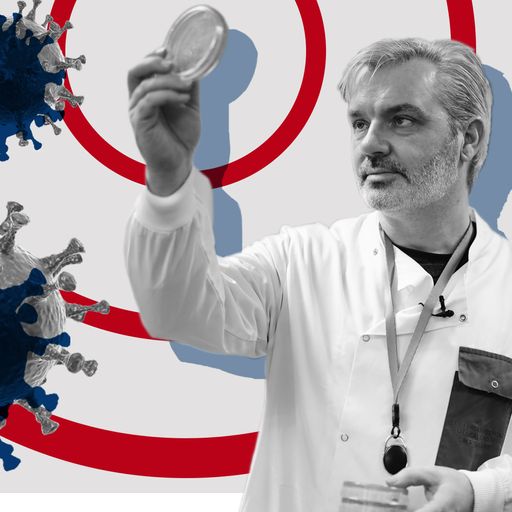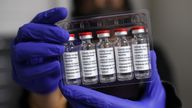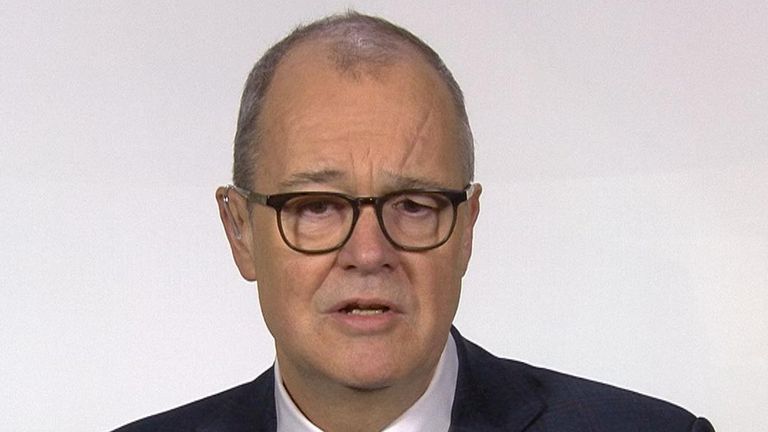Coronavirus: What is herd immunity? And how will it help prevent spread of COVID-19?
Around 60% of the UK's population of 66.4 million will need to become infected with coronavirus for herd immunity to be achieved
Saturday 14 March 2020 20:46, UK
Around 60% of the population will need to contract coronavirus in order for the UK to enjoy "herd immunity", the government's chief scientific adviser has told Sky News. But what does that mean?
What is herd immunity?
The "Vaccine Knowledge Project" at Oxford University describes herd immunity as when it is difficult for infectious diseases to spread, because a high percentage of the population is vaccinated.
This is because there are not many people who can be infected, meaning protection is given to vulnerable people such as newborn babies, elderly people and those who are too sick to be vaccinated.
But there is no vaccine for coronavirus?
Sir Patrick Vallance, the government's chief scientific adviser, has said a working coronavirus vaccine will not be produced in time for the current outbreak.
Therefore, in the absence of a mass vaccinations programme, for the UK population to gain herd immunity a large enough number of people will need to contract the virus and then recover.
They should then be much less likely to get the virus - and less likely to spread it - than they were before.
This can be described as "nature's vaccine".
At the moment, each person who catches coronavirus is likely to pass it on to between 2.4 and three people.
Most people will only experience a "mild" illness from COVID-19, according to Sir Patrick.
He has estimated around 60% of the UK's population of 66.4 million will need to become infected with coronavirus for herd immunity to be achieved.
That means around 40 million people will need to catch it.
The available evidence suggests 32 million, or 80%, of them would have mild symptoms; but around eight million people could become severe or critical cases and need treatment in hospital.
Key Points
- Mass gatherings in the UK will be banned from next week under plans being drawn up by ministers
- The London Marathon is among a number of sporting events cancelled
- Anyone entering New Zealand will have to self-isolate for 14 days
- US President Donald Trump has declared the outbreak a national emergency
- More than 145,000 cases and almost 5,500 deaths have been declared worldwide, according to Johns Hopkins University
- Italy recorded 250 cases in a day, bringing its total to almost 18,000
How does herd immunity help?
The key benefit of herd immunity is that it reduces the spread of a virus.
Therefore, those who are most vulnerable to COVID-19 - such as the elderly or those with underlying health conditions - can be isolated from the risk of the disease during the peak of the coronavirus outbreak.
Then, when the spread of the virus reduces and herd immunity is achieved, those isolation measures can be removed.
Simply put, isolating the most vulnerable in the short-term - while the rest of the population build up immunity and, subsequently, the spread of the virus slows - should mean they will be much less likely to contract COVID-19 in the long-term.
:: Listen to the Daily podcast with Dermot Murnaghan on Apple Podcasts, Google Podcasts, Spotify, Spreaker.
Sir Patrick has also suggested coronavirus could become a "seasonal virus" and "is likely to be one that comes year on year".
Herd immunity should help prevent coronavirus having such a big impact in the future.
However, it is not currently known how long it will take for 60% of the population to be infected, as that figure hasn't yet been reached in any country.
Should we rely on herd immunity to tackle the virus?
Some have criticised the government's strategy in dealing with the UK's outbreak.
Dr Adam Kucharski, infectious disease epidemiologist at the London School of Hygiene and Tropical Medicine, said he is "deeply uncomfortable with the message that [the] UK is actively pursuing 'herd immunity' as the main COVID-19 strategy".
He says herd immunity should not be the "outright aim" and instead we should be trying to reduce the impact on the UK as much as we can.
"Having large numbers infected isn't the aim here, even if it may be the outcome," Dr Kucharski wrote on Twitter.
He continued: "A lot of modellers around the world are working flat out to find best way to minimise impact on population and healthcare.
"A side effect may end up being herd immunity, but this is merely a consequence of a very tough option - albeit one that may help prevent another outbreak."
There is also the possibility that the population's immunity could wane over time.
Professor Mark Jit, another epidemiologist from the London School of Hygiene and Tropical Medicine, previously told Sky News that as more people are born, there will be more people who have not got immunity.
The virus could also mutate "very quickly to evade immunity" - but it is an "open question" as to whether this would happen, Prof Jit said.








